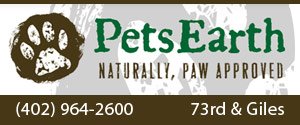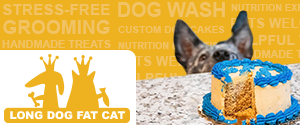- Do you subscribe to Dharma Dog Training’s Newsletter? You should.
- A Unique Campaign from The Humane Society of the United States
- Rabid bats in Omaha- Stay safe, prepared with these tips
- Springtime Activities in Omaha
- Mill Dog Monthly from Bailing Out Benji
- World Spay Day, Legislative Alert in Nebraska
- Attend the Nebraska Rescue Council’s monthly meeting this Saturday
- Five Hard-to-Ignore Reasons to Adopt!
- Paws in Pink to Benefit Breast Cancer Foundation
- VCA, Inc. Acquires MidWest Vet Specialists from Kansas State University
Being a “green” pet owner is easy and makes a BIG impact

Recently, we saw a featured Q & A with a newspaper columnist that involved a reader wanting to be a more environmentally-protective pet owner. The exchange, which can be found here, gives some great practices that will help any pet owner with lowering environmental footprints.
“You’re not alone in your efforts to be kinder to the environment,” the article stats. The “good news is that even little changes can add up to a big difference in the world. Here are a few easy ways to ease your pet’s burden on our planet.”
Adopt, don’t shop
As a pet owner, one of the greatest things you can do to support a greener existence is to adopt a pet rather than shop for a pet at a pet store or puppy mill. There are millions of homeless animals crowding our shelters and, by adopting a dog or cat from a shelter, you’re saving a life and making space in the shelter for another animal in need.
Beyond adoption, once you’re happily co-existing with your animal companions at home, there are more ways to support a greener life as a pet owner.
Scoop the poop
Leaving dog or cat waste where pets drop it might seem like a natural alternative to putting it in a plastic bag and dumping it in a landfill, but harmful bacteria from pet waste may seep into local groundwater, be swept away in rainwater runoff or — if flushed — survive sewage treatment and eventually contaminate streams, lakes or bays.
Some pet owners compost pet waste in a miniature outdoor septic tank. When shopping for poop bags, look for biodegradable bags that will decompose in the landfill–or reuse plastic grocery bags.
For cats, make sure you’re using litter made from materials that can be easily composted — such as corn, wheat or recycled newspaper rather than unsustainable clay.
Treating fleas with safer methods
A flea infestation is misery, but commercial “bug bombs” fill your home with potentially hazardous chemicals. Try controlling the local flea population by using a combination of non-toxic methods.
Grooming your pet regularly with a flea comb is a good start. As the fleas are caught in the comb, deposit them in soapy water to prevent them from jumping back onto your pet.
Fleas lay their eggs in the environment rather than on the animal, so cleaning up dust, debris and pet hair will also help. Wash pet bedding and vacuum every five days, and get the vacuum bag out of the house before those tiny flea eggs hatch. You can freeze or burn the bag contents to destroy the eggs. Using a wet vac with slightly soapy water is an efficient way to capture both stray fleas and eggs.
“Natural” or “food grade” diatomaceous earth (not the kind used in swimming pool filters) is safe to use in areas that can’t be reached by a mop or vacuum — the fine powder dehydrates fleas.
Safer pet food and pet food containers
Try to choose pet foods that are made with organic or human-food grade ingredients that avoid hormones and additives. It’s also helpful to buy in bulk to reduce packaging and transportation waste. Consider purchasing the biggest bag of dry food available and then store it at home in a large container. This also helps keep the food fresher for longer, preventing food waste in the process. Be sure to recycle wet food cans as well.
Just a few, relatively simple changes can add up to big results for the environment. These green pet care tips won’t just keep the most playful family members healthier. You’ll also add eco-friendly to the list of life lessons your kids will have learned from having a family pet. Your influence can change the planet for generations.
Thanks to Tabby at The Leader News for answering a reader question and giving us all some great ideas on being a bit greener in our pet care.
Latest News
-
Join Us at Pick A Pooch 2025: A Fun-Filled Weekend for the Whole Family
A Fun-Filled Weekend for Pet Lovers and Families Alike Mark...
- Posted 1 year ago
- 0
-
Beardmore Presenting Sponsor At This Years Pick-A-Pooch event
🐾 We are thrilled to announce that Beardmore Subaru is...
- Posted 1 month ago
- 0
-
How Having A Pet Can Change Your Life
Having a pet can open your heart in ways that...
- Posted 3 months ago
- 0
-
How To Improve The Life Of Your Senior Pet
Do you have an elderly fur baby and want to...
- Posted 3 months ago
- 0
-
Springtime Activities To Enjoy With Your Furry Friends
Are you preparing for warmer weather and want some ideas...
- Posted 4 months ago
- 0
-
Pros And Cons Of Microchipping Your Pets
Have you considered whether your pets should be microchipped and...
- Posted 5 months ago
- 0
-
The Best New Fun Toys For Dogs And Cats
The Best New Fun Toys For Dogs And Cats Did...
- Posted 5 months ago
- 0
-
Heartfelt Ways To Show Your Pet You Love Them
Did you know there are more ways to show your...
- Posted 6 months ago
- 0



















You must be logged in to post a comment Login